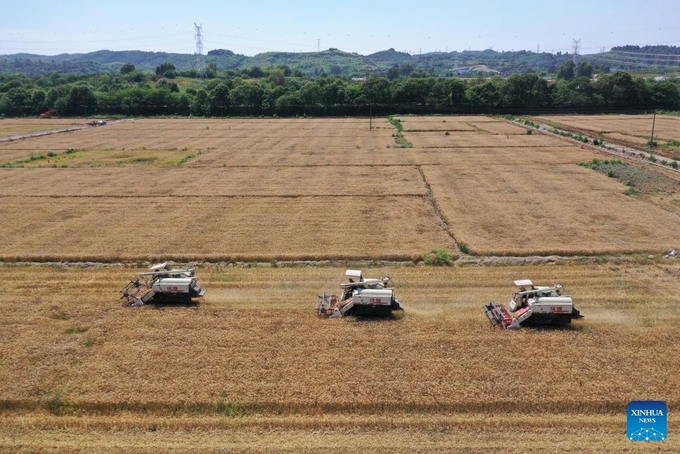June 17, 2025 | 23:42 GMT +7
June 17, 2025 | 23:42 GMT +7
Hotline: 0913.378.918
June 17, 2025 | 23:42 GMT +7
Hotline: 0913.378.918

An aerial drone photo shows reapers harvesting wheat in the farmland in Meishan City, southwest China's Sichuan Province, May 13, 2024. Photo: Xinhua.
The public can conveniently and quickly access information about the areas and location of permanent basic farmland through the ministry's website, app and a WeChat tool, according to the ministry.
This marks the first time at the national level that inquiry services for permanent basic farmland have been made available to the public online. The platform has maximized the data accessible to the public but some data needs further processing and refinement.
Some information related to land use approval, supervision and law enforcement needs confirmation with local county-level natural resources authorities. The platform will be updated and improved annually, with the goal of full coverage over time.
Permanent basic farmland is high-quality arable land that has been designated in accordance with the law and is under special protection, playing an important role in guaranteeing national food security, according to the ministry.
Once designed, the farmland cannot be occupied by any entities or individuals or change its purpose of use. The public can check the categorization of farmlands on the platform.
They can report to county authorities if they discover activities on permanent basic farmland including planting fruit trees, flowers, or excavating ponds for fish farming, or when permanent basic farmland is being occupied for residential or other construction purposes, or planting conditions of the permanent basic farmland are damaged due to the dumping of construction waste and other activities. Local authorities will verify the situation and take prompt actions.
The platform is an important supplement to the ongoing efforts across various regions to disclose information about permanent basic farmland and provides the public with more diverse channels to actively participate in the supervision and protection of permanent basic farmland.
Global Times

(VAN) Extensive licensing requirements raise concerns about intellectual property theft.

(VAN) As of Friday, a salmonella outbreak linked to a California egg producer had sickened at least 79 people. Of the infected people, 21 hospitalizations were reported, U.S. health officials said.

(VAN) With the war ongoing, many Ukrainian farmers and rural farming families face limited access to their land due to mines and lack the financial resources to purchase needed agricultural inputs.

(VAN) Vikas Rambal has quietly built a $5 billion business empire in manufacturing, property and solar, and catapulted onto the Rich List.

(VAN) Available cropland now at less than five percent, according to latest geospatial assessment from FAO and UNOSAT.

(VAN) Alt Carbon has raised $12 million in a seed round as it plans to scale its carbon dioxide removal work in the South Asian nation.

(VAN) Attempts to bring down the price of the Japanese staple have had little effect amid a cost-of-living crisis.